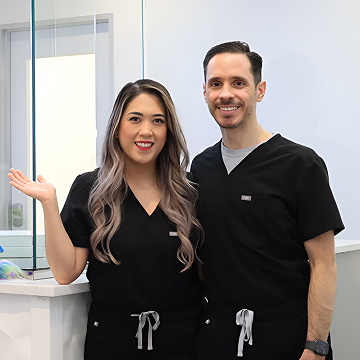What Are Restorative Dental Treatments? A Complete Guide
When it comes to your child’s smile, health is key. Restorative dental treatments are essential for fixing damaged or decayed teeth and ensuring that your little one has a bright, healthy smile for years. Whether you’re facing a cavity or need a more complex procedure, restorative treatments are here to help. Let’s dive into the world of restorative dentistry for kids!
What is Restorative Treatment?
Restorative dental treatments are procedures designed to restore the function, health, and appearance of your child’s teeth. These treatments can fix a wide variety of dental issues, from cavities to broken or chipped teeth. A Houston pediatric dentist may use a variety of methods to repair and protect your child’s smile. Some of the most familiar restorative treatments include:
- Fillings: Used to repair cavities or decayed teeth.
- Crowns: A cap placed over a decayed or weak tooth.
- Root Canals: Used when the decay or damage affects the tooth’s nerve.
- Bridges or Dentures: To replace missing teeth.
- Space Maintainers: Devices that hold the space for a one-stop or permanent tooth to grow in if a baby tooth falls out prematurely.
These treatments aren’t just about fixing the tooth; they aim to restore the tooth’s strength, structure, and functionality, allowing your child to eat, speak, and smile with ease.
Why You Need Restorative Treatment
It’s not uncommon for children to experience dental issues. From sugary snacks to accidental falls, there are plenty of ways that teeth can become damaged. Restorative treatments in Houston, TX, are often necessary when your child’s teeth experience:
- Cavities or Tooth Decay: One of the most common reasons children need restorative dental work. Left without treatment, cavities can lead to infection and even tooth loss.
- Chipped or Broken Teeth: Accidents happen, especially with active kids. Restorative work helps restore the tooth’s appearance and function.
- Misalignment or Missing Teeth: If a tooth is lost or doesn’t grow properly, restorative dentistry can help by filling in gaps and correcting alignment.
- Tooth Sensitivity or Pain: Restorative procedures may be used to treat pain caused by infection or damage.
Without restorative dental treatments, these issues can worsen over time, causing pain and potentially affecting your child’s overall health. Getting timely treatment ensures that your child’s teeth stay healthy and functional.
The Importance of Restorative Dentistry
Restorative dentistry is beyond simply fixing dental problems—it’s about helping your child maintain a healthy, confident smile. Here’s why restorative care is so important for kids:
- Prevents Future Problems: By addressing dental issues early on, restorative treatments can prevent more severe damage down the road. For example, filling a cavity when it’s small prevents it from spreading and potentially requiring more invasive treatments later.
- Boosts Self-Confidence: Kids who have tooth pain or visible dental problems may feel self-conscious about their smile. Restorative work helps restore a natural, beautiful smile that your child can feel proud of.
- Preserve Proper Function: Teeth aren’t just for looks; they play a key role in eating and speaking. Restorative dentistry helps maintain proper tooth function so your child doesn’t have trouble chewing or talking.
- Maintains Overall Health: Dental problems can sometimes lead to bigger issues, like infection. Treating dental issues with restorative procedures helps keep your child’s mouth—and body—healthy.
What to Expect After Restorative Dental Work
After your child has had restorative dental treatment, there are a few things to expect. Most children handle restorative procedures well, but they may experience some discomfort afterward. Here’s a quick guide to what’s normal after dental work:
- Minor Discomfort: Your child may feel some tenderness in the treated area for a few days. This is completely normal and should fade quickly.
- Follow-Up Care: If your child had a more complex procedure, like a root canal or a crown, you might need to follow up with another appointment to check on the healing progress.
- Eating and Drinking: It’s a good idea to avoid hard, sticky, or chewy foods right after treatment. Your dentist will give you certain guidelines for what your child can eat and when.
- Good Oral Hygiene: Even after restorative work, maintaining a good oral hygiene routine is essential. Brushing and flossing regularly will keep your child’s smile healthy and help prevent future dental issues.
The recovery process is typically smooth, and your child should be able to return to their normal routine soon after the procedure. Just make sure to monitor the treated area and follow the care instructions given by your pediatric dentist.
Final Thoughts
Restorative dental care helps keep your child’s smile strong, healthy, and pain-free. Whether it’s fixing a cavity or protecting a growing tooth, the right treatment makes all the difference. If you’re looking for a trusted pediatric dentist near you, Greenway Pediatric Dentistry is here to support your child’s dental health with expert care and a gentle touch.

Trusted Pediatric Dental Experts
Dr. Michael Posada Orozco, DMD, MSD, CAGS, and Dr. Andrea Lam, DMD, MSD, MA, are board-certified pediatric dentists at Greenway Pediatric Dentistry in Houston, TX. With advanced training in pediatric dentistry and child development, they bring years of specialized experience in caring for infants, children, and adolescents.
Dr. Posada Orozco’s background includes extensive graduate studies that shaped his expertise in preventive care, minimally invasive treatments, and long-term oral health for growing smiles. Dr. Lam combines her clinical skills with a strong academic foundation, focusing on creating positive dental experiences and building healthy habits that last into adulthood.
Together, they are committed to pairing modern dental advancements with a warm, welcoming environment, ensuring each child receives safe, trustworthy, and high-quality care in a supportive environment.

